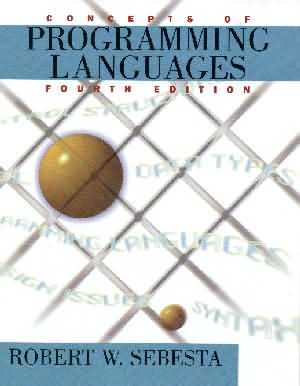 Instructor:
Albert L. Crawford
Instructor:
Albert L. Crawford
Text: "Concepts of Programming Languages, 4th Edition" by Robert Sebesta.
The Course: This course is a study of the concepts underlying high level programming languages. This includes formal language theory, data types, scoping, control structures, and subprograms. Also included in the course are various programming concepts, including functional and logical programming.
Assignments: The students will be given reading assignments and programming assignments throughout the course. Included in these assignments will be several assignments using the programming language Java and about two assignments in the language LISP. These assignments will be weighted at 10 to 25 points each.
Color and Timer Applet Test
Working Java source code for
expression evaluator EBNF: Number { '+' Number }
Project: Each student will be required to learn on their own
a programming language. The project will have several phases
Exams: There will be two regular hour exams during the semester. These exams will be weighted at 100 points each.
Final: The final examination will be weighted at 150 points and will cover the material from the entire course with the material from the last third of the course being given the most weight.
Makeup of work: Should an absence be known ahead of time the student should so inform the instructor and get his approval. Work that is due during such an absence should be turned in prior to the absence or sent to class with a classmate. If an exam is scheduled during such an absence the student may be required to take the exam early.
Makeups for missed regular exams will not be given unless the reason for the absence is determined by the instructor to be valid and necessary. It is the students responsibility to make the reason for the absence known to the instructor as soon as is reasonably possible.
Grades: All grades will be based on a 90, 80, 70, 60 percentage of all points for grades of A, B, C, and D. Any "curves" that will be placed on the grades will be made on the individual tests and not at the end of the semester. Such curves are not likely. Final grades will not include a "+" or "-".
Course Requirements: It is expected that all assignments be complete and turned in on time. Late or incomplete assignments will be given a score of -100% until they are completed. At that time they will be given a score of zero.
Cheating: I do not expect this paragraph to apply to anyone. However, in the very unlikely event that a student is caught cheating please see the student "blue book" for the penalties that the instructor has the authority to apply.
Attendance: Again, I do not expect this paragraph to apply to anyone. However, you are expected to attend class. Any unexcused absence is considered excessive. If such absences reaches three or more the student will receive a letter grade reduction in his/her semester grade and given a warning. Upon the next unexcused absence the student will be dropped from the class with a grade of F. Attendance will be taken at the beginning of each class.